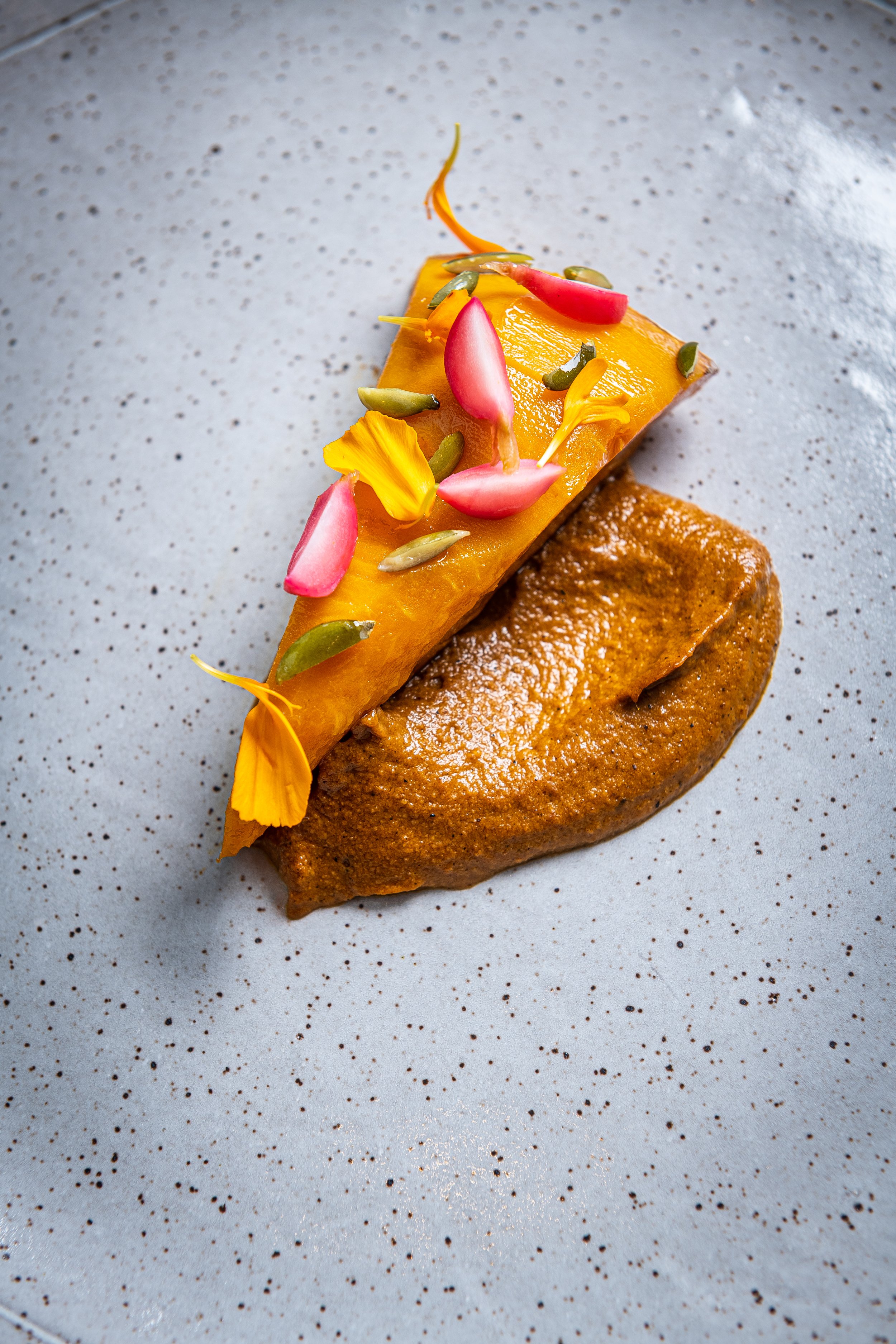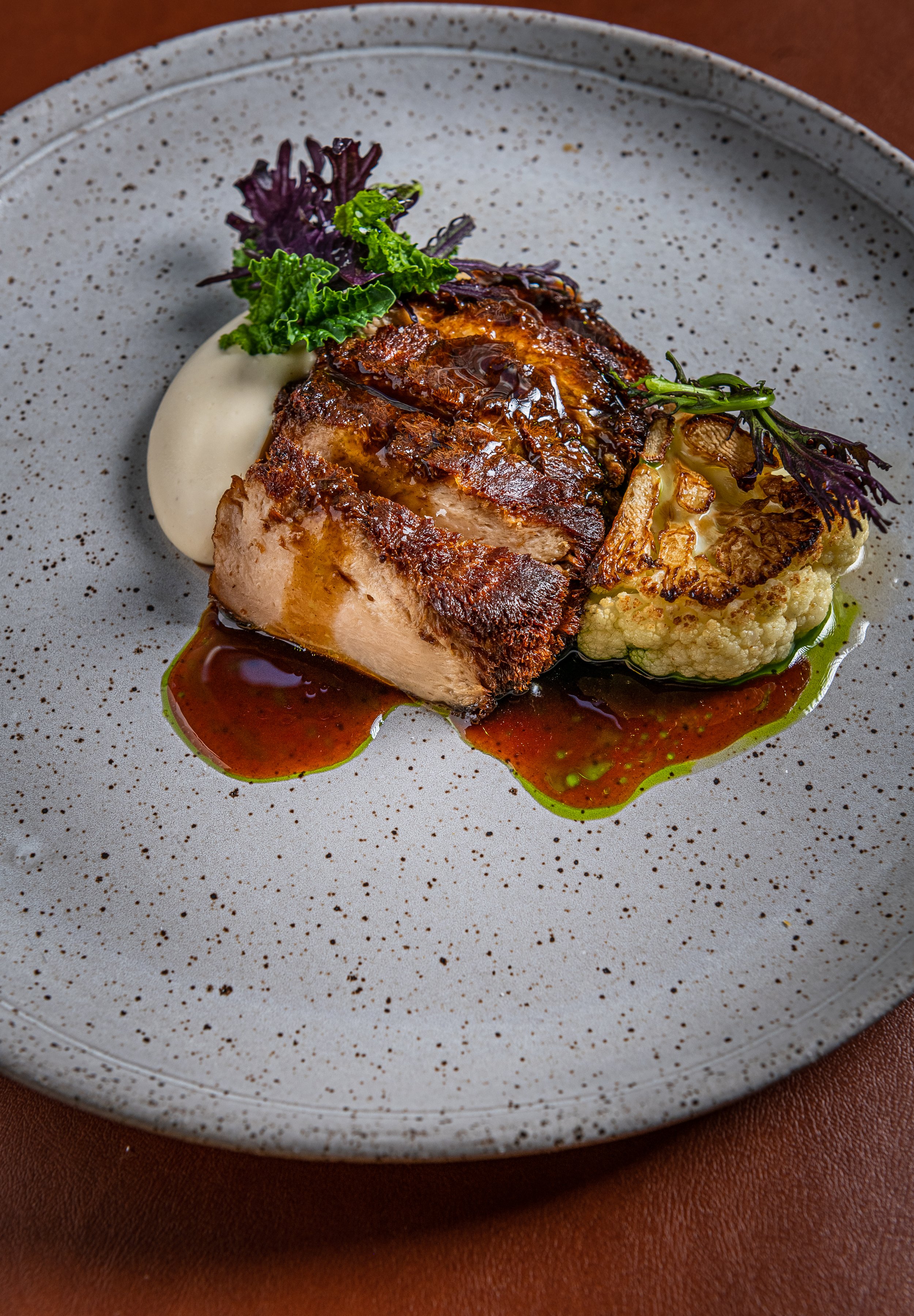Q&A with Rob Rubba, Chef of Oyster Oyster in Washington, DC
Rob Rubba, Chef of Oyster Oyster | Photo: Rey Lopez
Just days after receiving his award, Gastronomer had the privilege of speaking with the James Beard Foundation’s newly awarded Outstanding Chef, Rob Rubba of Oyster Oyster located in Washington, DC. Since Oyster Oyster opened in 2021, the restaurant and Chef Rubba have racked up acclaim among food critics far and wide, recognition as Food & Wine’s Best New Chef in 2022, a coveted Michelin star, and now, one of the most sought-after awards in our country’s culinary industry. With the exception of the new vegan menu at the legendary Eleven Madison Park and a few other dining establishments, plant-based restaurants proportionally have more difficulty earning industry and media accolades compared to restaurants relying more heavily on animal products – so how has Rubba garnered such unanimous praise?
Through shared vision, unrelenting commitment to sustainability, and an abundance of ingenuity and talent, Rubba and his team have succeeded in creating a culinary gem and new model for restaurants that combats the notoriously unsustainable practices found in most of our country’s restaurants. Oyster Oyster ups the ante when it comes to sustainability, going beyond the commonplace sustainable practices many restaurants already employ. From using leftover cooking oil to make candles for their dining room tables, to creating physical menus made of sunflower seeds, which guests can plant in their backyards and grow into actual sunflowers, Oyster Oyster’s ethos goes beyond just food on a plate. The restaurant’s menus are thoughtfully and meticulously comprised of seasonal, hyper-local produce sourced from organic and regenerative farms, allowing the restaurant to minimize food waste and better control its carbon footprint, while also providing guests with a unique dining experience comprised of superior ingredients grown locally. While Oyster Oyster’s menu is plant-based, the restaurant does integrate oysters into its menu as a nod to the important role oysters play in local ecosystems, such as that of the nearby Chesapeake Bay.
Speaking with Chef Rubba, you sense his deep-seated passion for sustainability and creating healthier and better foodways within the hospitality industry. Beyond his work at Oyster Oyster, Rubba is also a member of the Slow Food movement and has spoken at conferences and events about the importance of eating local and seasonal food. He is also a mentor to young chefs and has worked with the James Beard Foundation to develop programs to support diversity in the culinary industry. Chef Rubba is also a co-founder of Bakers Against Racism, an online bake sale initiative that has raised over $2.5 million for social justice organizations since 2020.
Q: What does it mean to you to earn recognition from the James Beard Foundation as this year’s Outstanding Chef?
“This year, the Foundation made a lot of great leaps into looking at food from a lot of different angles, and what makes a great meal, and how community is a huge part of that as well. It's really exciting. For a restaurant void of caviar and traditional luxury ingredients, to be recognized for our cooking and efforts towards sustainability and plant-forward cuisine, is really awesome. It’s something that really hasn’t happened in the past. It’s great for the movement and it inspires others that are leaning that way and shows they can do it, now that there is representation. A younger version of me was very interested in the traditional forms of high-end cuisine, but now it's all about this work and what I can do for the future of the industry.”
Photo: Rey Lopez
Q: How did sustainability become such a driving force behind your restaurant and work?
“I love going to restaurants. I think they're magical places. Some of my best memories are at restaurants. It's where people celebrate milestones. Six years ago when I was really starting to think about sustainability and what's going on in the world and how our food systems contribute to a lot of the problems we see with climate change and the effects on our environment. I saw this thing that I love being a big contributor to these problems and it created a lot of existential questions within me, like, should I even be doing this anymore? And then I realized it's the only thing I know how to do so I might as well try to do it in a better way and build a restaurant around the things that we want to see in the future.”
Photo: Rey Lopez
Q: Describe Oyster Oyster’s approach to hospitality?
“We cut out a lot of the formalities and wanted our servers to be genuine and have honest interactions with our guests. We didn't want a giant restaurant where our staff couldn't take the time to be thoughtful with our guests. I also wanted a space where the team would all work together. It's important for us that our cooks are part of the service team, as well. They're running the food and engaging with the guests too. This way, the person dropping the dish at the table thoroughly knows the preparations of it from start to finish. They’re the expert on it, so who's better to talk to the guest about that dish? It's a really well-rounded ecosystem within the restaurant and it’s really healthy this way because everyone is on the same team instead of putting up these barriers between the front and back of house. Sustainability and the environment are central to our restaurant, but so is the sustainability of our employees and the environment we create within our walls. We want to create a place where an individual can thrive and grow.”
Photo: Rey Lopez
Q: Working at a plant-based restaurant, do you feel restricted by what ingredients you can use? How do you continuously find inspiration?
“Putting up these parameters has resulted in some of the most creative work I've ever done as an individual. I've cooked with everything you can imagine and the most expensive ingredients in the world, yet this is some of the most rewarding work I've experienced. And I feel the team loves it too. Creating new dishes feels so intuitive now. Younger me would do the sketches and draw these pictures of plates and then kind of force the food into that, but that is far removed from our repertoire and how we do things at Oyster Oyster. For us, it’s a constant evolution. When we have a new ingredient there is lot of failure and experimentation, but from that we also discover a lot of really great things. We’ll take this ingredient and run it through all the systems we can. Let's try braising it, let's try this, let’s try that. We’re constantly trying to explore these limitations we have and be as creative as possible. Ultimately, it’s about making delicious decisions and not just intellectual decisions when it comes to food that's on a plate.”
Photo: Rey Lopez
Q: What’s one of your favorite dishes on Oyster Oyster’s current menu and how did it come about?
“Right now we have this roasted lion’s main mushroom dish. We've been playing around with that mushroom since opening, and it comes and goes from our menu, bu this iteration is probably my favorite. I think we've really figured out how to get the most flavor and texture out of it and it's really lovely. We press it, then we roast it, and then we put it on the grill. We then brush it with a rich vegetable reduction, almost like a demi-glace sauce, that absorbs into it. And this dish is a product of those little evolutions I was referring to. It’s a great main course for the tasting menu. When we bring it to the table, everyone always says it looks like chicken or steak. We don't call it a steak, but it's great for non-vegetarian or non-vegan diners to see this dish that is almost representative of something they know. It's kind of welcoming and comforting to them.”
Photo: Rey Lopez
Q: What advice can you give to those starting out in the hospitality industry?
“I think it's important to not spend your money on ridiculously fancy knives and a fancy apron. It's important to put your money towards going out and eating a lot. Eat every type of food you can, from a street stall to a fancy restaurant, and really experience the food and see all the amazing things that are out there. By doing that, you will find what you really love. Let that guide you instead of what is flashy or what the biggest trend is. Find what speaks to you and then follow that journey.”
Photo: Rey Lopez







